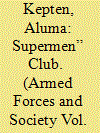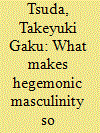| Srl | Item |
| 1 |
ID:
180837


|
|
|
|
|
| Summary/Abstract |
The emergence of a global far right has been seen as a significant development in recent years and as a challenge to wider forms of neo-liberal globalization. While much has been written about its significance and representation, little has been written on either the gendered nature of the far right and the role that women have played as actors within it. Though there still remains a gender gap in terms of the support and participation of the far right, there has been an increasing rise of leaders and figureheads within the respective movements themselves. This article argues that despite the emergence of these women, the far right looks to construct an extreme form of masculinity in which anti-feminism appears as a significant part of its overall strategy. By engaging with both the Gramscian understandings of hegemonic construction and subsequent notions of masculinist hegemony, it argues that the appearance of women both as leaders and ‘organic intellectuals’ within respective national movements allows them to gain greater legitimacy. Rather than ‘feminizing’ or indeed moderating the form of far-right narratives, women had looked to re-inforce such extreme masculinity by adding to existing understandings of anti-immigration, nationalism and in particular of the meaning of ‘anti-feminism’. Thus, recent leaders of far-right political parties appear alongside media columnists and ‘celebrities’ in contributing to the construction of extreme masculinity with the far right.
|
|
|
|
|
|
|
|
|
|
|
|
|
|
|
|
| 2 |
ID:
189923


|
|
|
|
|
| Summary/Abstract |
How does secrecy shape narratives of militarized hegemonic masculinity? This article assesses a gap at the intersection between theories of masculinities and organizational secrecy. Supported by 15 interviews with current and former male workers of a covert section of an Israeli national security organization, it argues that secrecy is experienced as both an external hurdle and a central component to the way that men internalize masculinity. Unable to access social capital outside the security organization, the respondents of the study construct a social field inside it through which they can assert their masculinity. They do so by conceptualizing their jobs, themselves, and the organization through a prism of sacrificial warriorhood, and actively incorporate secrecy’s constraints into a narrative of “super-men”. This study thus examines secrecy in the context of a militarized environment, showing the experience of masculinity and a perceived lack of power-access among members of a dominant group.
|
|
|
|
|
|
|
|
|
|
|
|
|
|
|
|
| 3 |
ID:
187074


|
|
|
|
|
| Summary/Abstract |
Research on ‘hegemonic masculinity’ needs to more specifically examine its hegemonic properties by analysing how masculine ideals embodied by white men have become pervasive and widely-accepted by men of colour through their voluntary compliance and consent. This paper analyses the influence of hegemonic masculinity on the lives of Japanese American men. Because they have adopted hegemonic masculinity as an idealised standard that they aspire to, but cannot attain, their subordinate masculinity is construed as inferior and effeminate, constraining their romantic power over women. Such negative assessments are shared by Japanese American women, who are also under the pervasive influence of hegemonic masculinity. In response, some Japanese American men attempt to appropriate the qualities of an idealised manliness in public performances, indicating how they continue to conceive of their masculinities in hegemonic terms. Although a few of them valorised Asian American manhood in order to challenge hegemonic conceptions, such alternative masculinities may eventually be appropriated by hegemonic masculine discourses to perpetuate pre-existing racial inequalities.
|
|
|
|
|
|
|
|
|
|
|
|
|
|
|
|